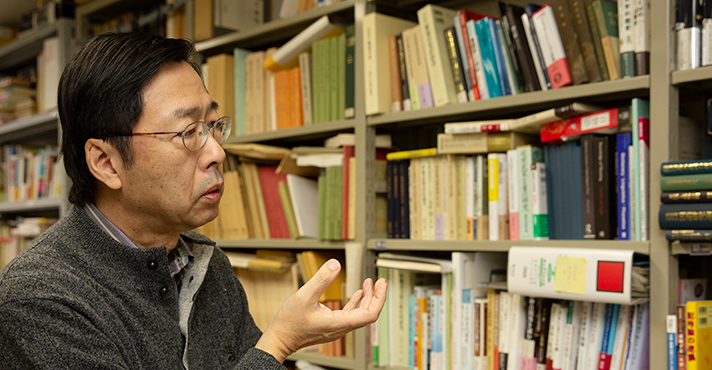
Professor Satoshi Kinsui, Graduate School of Letters
"The External Social Benefits of the Humanities"
It all started with a graduation speech...
In 2016, I gave a graduation ceremony speech as Dean of the School of Letters at Osaka University. In that speech, I addressed the value of the humanities. I decided to do so because a couple of years earlier, the humanities were the focus of public discourse when policymakers and business circles advocated the restructuring and scaling-down of the humanities departments at national universities. In that speech, I emphasized the value of the humanities for the individual, i.e., the knowledge that students have gained in the humanities will serve them in tackling the variety of problems they will encounter in the future by allowing them to think about challenges on a deeper level. I also wanted to encourage and reassure those graduating students and have them take pride in themselves as literature graduates.
External social benefits
I uploaded the speech on my blog a few days later, and to my surprise, it received quite a bit of attention on SNS, garnering about 4000 retweets. Many readers expressed their sympathy, but I also received valuable criticism. One such critical comment by Professor Fumio Ōtake, one of my colleagues at the School of Economics, was that it is not enough to state the individual benefits, but rather, it is important to stress the external social benefits of the humanities. What students learn through the humanities does not just benefit themselves but society as a whole; it forms their character, and equips them with both the ability for self-reflection and the strength to face the various challenges they will encounter in life. For years, we humanities scholars have failed to communicate this positive externality (正の外部性) to society [1] . This has been due to the fact that we have been lacking what I would refer to as ‘social literacy.’
Inward-looking humanities
Traditionally, many scholars in the humanities have engaged in self-complacent reasoning, arguing that the humanities do not have to be useful to society to be useful. At the same time, that has served to conceal our self-doubt as to our relevance. In fact, our lack of social literacy is exemplified in our tendency to secretly ask ourselves whether the humanities are actually useful or not. By committing ourselves to such a line of reasoning and discourse, not only have we remained inward-looking and unable to admit our own strengths and weaknesses, but it has also hindered us from extending our reach.
Innovation through openness
We need to move beyond the borders we have defined for ourselves and actively seek out new areas for collaboration with other fields. It is a well-known fact that the best and most innovative ideas and research achievements have been made by researchers with a broad set of interests. A project by DWANGO and the Paleoseismology Workshop at Kyoto University serves as a successful example of inter-disciplinary efforts. Established in 2012, the Paleoseismology Workshop includes participants from a broad range of fields, including seismology, geology, meteorology, history, geography, informatics, science history, and museology. All have an interest in learning how to decode ancient historical writings related to natural disasters and produce reprints of these documents. In their project, the group managed to digitally reprint in block letters historical documents that were written in running form Chinese characters, using KuLA (Kuzushiji Learning Application), an application that Professor Yōichi Iikura at the School of Letters at Osaka University helped to develop.

The importance of liberal arts education
Nowadays, universities are evaluated based on how well they perform and produce outcomes on easily measurable indicators. Some disciplines benefit from such evaluation, but the humanities are directly involved in the cultivation of students. As much as universities train experts, they also need to make sure that these experts are well-rounded. That is at the heart of liberal arts education, and therein lies the raison d’etre of the humanities in higher education.
The differences between the humanities and the natural sciences are obvious not just in terms of their respective subject content, but also in the type of knowledge that each produce. In many natural sciences disciplines, protection of knowledge produced may be straight forward. Companies are more likely to fund research that produces results which they then can claim for themselves. But the outcomes of research in the humanities may very rarely be subjected to such regulation. They are open to anyone and feed back into the education of students, contributing not only to their knowledge but also to how they view the world and choose to act in it. In this respect, their outcomes are indirect and hard to objectively evaluate.
Continuing to support the humanities
Of course, as society changes, liberal arts need to undergo change as well. But this is also the reason why we need to keep research in the humanities strong. Research in the humanities forms the foundation upon which the liberal arts stand and are updated to fit the developments of society. Increasingly scarce resources are a major challenge for society as a whole. In the face of such challenges, continuing support for the humanities has appeared to many as an unnecessary luxury with minimal contribution to solving these challenges. Such a line of reasoning is equally narrow-minded, minimizing our ability to find innovative solutions through complexity and diversity in views, opinions, and knowledge.
[1] Externality is a cost or benefit that affects a third party not directly involved in an economic transaction (Mankiw, Gregory, 2017, Principles of Economics, South-Western Pub, chapter 10 Externalities).
Edit: Kim Mawer, Christopher Bubb
